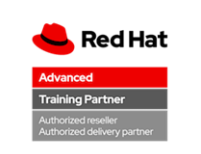category
Red Hat OpenShift Development I: Introduction to Containers with Podman

Type
Virtual
Classroom ILT
Skill Level
Available dates
Learning Path
Virtual
Duration
1 Day

TYPE
Virtual
Classroom ILT
LEARNING PATH
SKILL LEVEL
DURATION
AVAILABLE DATES
Introduction
A developer introduction to building and managing containers with Podman for deploying applications on Red Hat OpenShift.
Red Hat OpenShift Development I: Introduction to Containers with Podman (DO188) introduces students to building, running, and managing containers with Podman and Red Hat OpenShift. This course helps students build the core skills for developing containerized applications through hands-on experience. These skills can be applied using all versions of OpenShift, including Red Hat OpenShift on AWS (ROSA), Azure Red Hat OpenShift, and OpenShift Container Platform.
Audience Profile
Developers and Site Reliability Engineers that are new to container technology
System administrators and platform operators who are interested in managing OpenShift clusters and containerized applications should enrol in Red Hat OpenShift Administration I: Containers & Kubernetes (DO180)
Pre-requisites
Some experience with web application architectures and their corresponding technologies
Experience in the use of a Linux terminal session, issuing operating system commands, and familiarity with shell scripting is recommended.
Course Objectives
By the end of the course, you should be able to meet the following objectives:
- Introduction to containers
- Run containers with Podman CLI and Podman Desktop
- Build custom container images
- Manage container images
- Remote debugging with containers
- Basic container networking
- Persist data with containers
- Run multi-container applications
- Troubleshoot Container Deployments
- Orchestrate containers with OpenShift and Kubernetes
Course Content
| Session 1: Introduction and overview of containers |
| Describe how containers facilitate application development |
| Session 2: Podman basics |
| Manage and run containers with Podman |
| Session 3: Container images |
| Navigate container registries to find and manage container images |
| Session 4: Custom container images |
| Build custom container images to containerize applications |
| Session 5: Persisting data |
| Run database containers with persistence |
| Session 6: Troubleshooting containers |
| Analyze container logs and configure a remote debugger |
| Session 7: Multi-container applications with compose |
| Run multi-container applications using Compose |
| Session 8: Container orchestration with Kubernetes and OpenShift |
| Orchestrate containerized applications with Kubernetes and OpenShift |
Associated Certifications and Exam
The Red Hat Certified Specialist in Containers exam (EX188) tests your skills and knowledge of the fundamentals of containers, including the ability to find, customize, run, and manage containerized services in stand-alone environments. This exam is based on RHEL9, podman v4.4 and OCP v4.14 but the content is applicable to all OCP v4 releases including OCP 4.10 and OCP 4.12. Candidates can use any OCP v4 release to prepare for the exam.
By passing this exam, you become a Red Hat Certified Specialist in Containers, which also counts towards earning a Red Hat Certified Architect (RHCA).
Audience for this exam:
Administrators, architects, software developers, and anyone responsible for creating, managing, or using containers, including those who want to demonstrate their understanding of the key concepts and processes underlying the use of containers in modern software.
Developers who wish to containerize software applications.
Administrators who are new to container technology and container orchestration.
Architects who are considering using container technologies in software architectures.
Site reliability engineers who are considering using Kubernetes and Red Hat OpenShift.
On successful completion of this course students will receive a Torque IT attendance certificate.

Red Hat Overview
Business today demands additional flexibility, efficiency and performance from technology solutions. Authorized Red Hat training and certification provides our customers with the skills required to maximize your Red Hat Enterprise technology investment and keep the IT organization running at optimal performance.
Torque IT considers authorized Red Hat training to be an integral part of any Red Hat technology implementation. Red Hat authorized training, and associated certification, ensures that you get the most from your technology investment and that you are able to operate above the technology curve.
Red Hat certifications are universally recognized as demonstrating a high level of expertise and credibility for individuals and the organisations that employ them. Authorized Red Hat training and certification is the industry standard for any solution that includes designing, selling, implementing, upgrading, managing and utilizing Red Hat technology solutions.
For half a decade, Torque IT has maintained the status of Certified Red Hat Training Partner in South Africa which is the highest level of accreditation that Red Hat authorizes to Learning Partners that offer technical, product, and solutions training. These achievements reflect our commitment to providing our customers with quality skills development, enablement, training, and certification solutions that demonstrate exceptional depth, breadth, and expertise across Linux Platforms, JBoss Middleware, Virtualization, Cloud computing, Storage and Mobile certifications. Torque IT is recognized by Red Hat, and the industry, as having met rigorous standards for educational competency, service, customer satisfaction and investment in technologies that will prepare the next generation of IT industry professionals to exploit Red Hat technology solutions.
Our portfolio of authorized Red Hat courses provide customers with various enablement and certification paths that cater for a wide variety of existing skills and certifications. Whether you require an accelerated transition from Solaris or are a Windows administrator seeking the corresponding Linux skills, our portfolio of authorized courses, customized solutions and professional guidance ensure maximum return on your Red Hat Enterprise investment.
